Have you picked up your copy of the 2022 Dobber Hockey Prospects Report yet? If not, why not? Just head on over to the Dobber Shop to read up on all the fantasy prospects that fantasy owners need to know. There are hundreds discussed from a variety of angles, all with a fantasy bent.
*
Paul Maurice was hired as the head coach of the Florida Panthers, replacing interim head coach Andrew Brunette. Alex MacLean wrote about this from a fantasy perspective yesterday.
My only real thought is why Florida would do this. If people want to say they were out-coached in the playoffs, I wouldn't argue. But it's not as if Maurice has a lengthy résumé of deep playoff runs in Winnipeg. It will be interesting to see the pace Florida plays with next season, considering how good they were in 2021-22.
*
Despite some questions as to whether Darcy Kuemper might start in Game 4 after being shelled in Game 3, he proved to be the difference for Colorado early in the game. The Avalanche were swarmed by Tampa Bay's relentless forecheck which led to turnovers, and some good chances for the Lightning.
With the game tied 1-1 in the second period, Victor Hedman made a play we've been looking for all series, and scored a beautiful goal to give the Lightning a 2-1 lead:
Despite the Lightning heavily carrying the play through 40 minutes, their lead was disappeared by an Andrew Cogliano goal early in the third period. That gave us a 2-2 game, a score that would hold until overtime.
Colorado found their legs as the extra frame wore on, hitting the post on a couple occasions, and putting Andrei Vasilevkiy to the test in goal. Notably, Bowen Byram was continuously involved in the offence and even had a crossbar off a great patience play from Valeri Nichushkin. It really is a game of inches.
The game-winner would come off the stick of Nazem Kadri, who made a pretty outside-inside dangle on the Mikhail Sergachev. Kadri, who had missed a handful of games following that awful Evander Kane hit, proved a difference-maker in this one. Colorado now has a commanding 3-1 series lead as the matchup shifts back to Denver.
*
Over my last couple Ramblings, I've been discussing players who contributed significantly to scoring chances for their team. I discussed younger players in this write-up while discussing more veteran players here, though just two players in the two Ramblings are over 25 years old. The reason for this is to see which players had good production that also had good underlying processes, like scoring chance generation. Finding out who took, and who set up, a high rate of scoring chances helps us determine whether high levels of production were a mirage of percentages/luck, or genuinely good play. There are varying levels of arguments that all the players discussed in those Ramblings played very well offensively, which gives us a bit of confidence moving forward. We have to discuss the flipside, though.
For anyone that skipped those Ramblings, I'm looking at Scoring Chance Contributions (SCC), determined as scoring chances taken, or generated for teammates, per 60 minutes at 5-on-5. The data comes from Corey Sznajder, who manually tracks hundreds of games every season, to break down the data in dozens of categories (his Patreon is here). Additional data may also be used from Natural Stat Trick or our own Frozen Tools.
So, let's look at the bottom of our list. Let's look at players who did not contribute much to scoring chances for their team in 2021-22, and what that may tell us for 2022-23 and beyond.
Dominik Kubalik and Arthur Kaliyev
These two are being included together because both were discussed by me at length since the end of the regular season. The piece on Kubalik is here and the write-up on Kaliyev is here. In summary, the Ramblings on Kubalik found that he wasn't a well-rounded offensive player, struggling in a lot of areas related to playmaking, while Kaliyev's piece focused on his low shot conversion rate.
When looking at the SCC data for Kubalik, the playmaking issues come to the forefront. In our 215-player sample, Kubalik was 211th in SCC. He had three (3) scoring chance assists in his 275-minute sample. For reference, Troy Terry had 16 in 267 minutes while Anthony Duclair had 23 in 300 minutes. In relatively similar minutes, guys we think of as goal scorers were several factors higher in scoring chance assists than Kubalik was. Without him being elite in transition, Kubalik remains little other than a shot-bot. The discussion of coaching and line mates is for another day, but this is nothing new for him, and having such a limited underlying profile puts a ceiling on what he can produce, particularly in the assists department.
As for Kaliyev, while we focused on his conversion rate in that other article, the playmaking is also a big problem. He had four (4) scoring chance assists in 311 minutes of ice time, not far off from Kubalik's per-minute mark. Of course, the difference here is Kaliyev just finished his rookie season at the age of 20, while Kubalik just finished his third season at the age of 26. We should have a lot more faith in Kaliyev improving this area of his game, as well as his transition work. Kaliyev is still a few years from his prime and he has a lot of skills he needs to work on to turn into an elite offensive option. He is still at least a 20-goal threat no matter what, but being able to post 20 assists or 40 assists in a season in the near future will depend heavily on his ability to develop these skills. It also helps that the team around him should (ostensibly) improve as guys like Quinton Byfield and Brandt Clarke start to make big impacts on the main roster.
Both these guys were in the bottom-30 of our sample (15th percentile or worse) by SCC in 2021-22, but there is reason for optimism for at least one of them. Both can contribute in the fantasy game but line mates and the offensive environment they're in need to take a leap, along with other offensive skills besides shooting.
The name that stuck out to me on our list immediately was Kopitar. He finished 201st out of 215 players by SCC in this data set. Considering the Los Angeles Kings finished fourth in the league (!) by scoring chances per 60 minutes at 5-on-5 shows just how big of an outlier this is. But it's only an outlier on this team in the season 2021-22 because this is a problem that has persisted. In the COVID 2021 season, the league average of scoring chance assists per 60 minutes was 2.48; Kopitar finished the campaign at 2.57 SC assists per 60, or slightly above average. He was well below average in scoring chances taken, too. In other words, this is now two seasons of poor scoring chance contributions from Kopitar, and considering he turns 35 in August, this is a problem.
To illustrate this problem, let's look at HockeyViz. We can see how Viktor Arvidsson and the Kings performed when he wasn't skating with Kopitar, having spent ~200 minutes with him and ~690 minutes without him. This is the expected goals for with Arvidsson on the ice sans Kopitar:
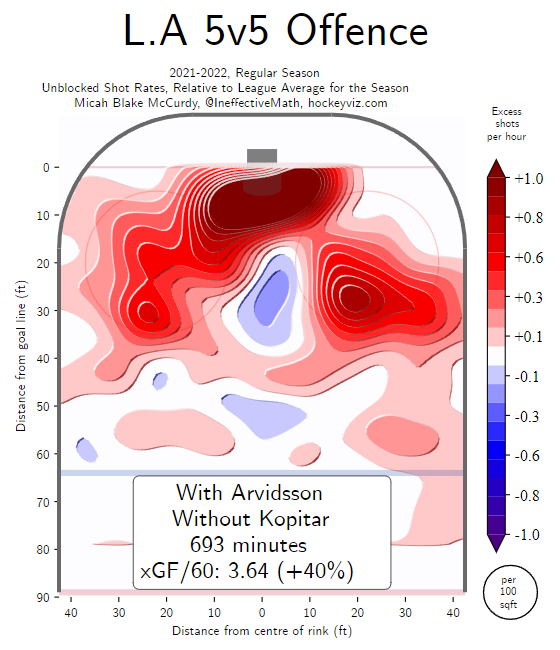
Conversely, this is how well the team generated expected goals with them on the ice together:
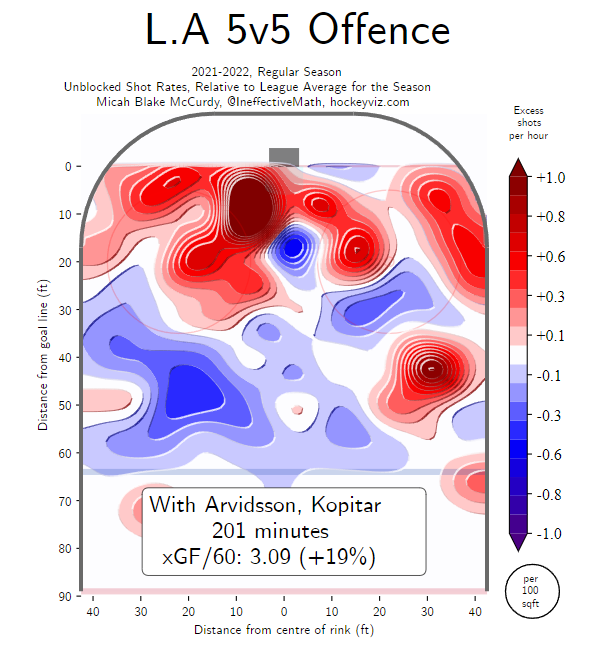
It is a fairly significant drop, and when we look at actual goals scored, the drop is even more steep (3.4 goals per 60 without him compared to 2.1 with him). Whether by process or results, Arvidsson was much worse off with Kopitar than without, and that's a problem for the Kings. It isn't a zone start thing, either, as the duo of Arvidsson and Kopitar were sent out in the offensive zone much more than the defensive one when they skated together.
What mitigates a lot of this is the captain's ice time, having skated 20:46 a game, including locked top PP minutes, for the season. Unless Byfield takes a huge step forward, we should see Kopitar around 20 minutes with top PP time yet again. He posted 67 points in 81 games so there's not much reason to think he can't threaten 20 goals and 60 points again, especially if his shot-rate jump we saw repeats itself. For that reason, he's still a viable fantasy asset. If he sees a big ice time cut because Byfield takes a leap in his development, well, that's when the issues really start to matter.
There aren't many more interesting teams than the New York Islanders. The team's defence fell apart in 2021-22 and there were several factors at play, notably the extended road trip to start the season and the COVID pauses that seemed to affect them significantly. The reality is even once they got past these issues (after Christmas), they were a middle-of-the-road scoring team, and their scoring chance rate was basically equivalent to that of Seattle's. That's not good. Beauvillier was one of the worst offenders, coming in the 16th percentile of SCC in this data set, tied with Nashville's Luke Kunin. Not really great company to keep for a guy the Islanders, and fantasy hockey owners, are hoping could be a breakout star.
His problem is one that has persisted for a couple years now: poor playmaking data. Beauvillier had just four scoring chance assists in the 255-minute sample from 2021-22, or 0.94 per 60 minutes. That's worse than the aforementioned Kaliyev, and also worse than Luke Glendening. Again, not company to be keeping in this regard. His strength comes from shooting, where he was well above-average in COVID 2021, posting rates similar to Craig Smith and Sam Reinhart. Yes, he scored just 12 goals in 74 games in 2021-22, his lowest goal total since his rookie season. That was on the back of 7.8% shooting, having shot 13.6% over his previous 267 regular season games. If he shoots 13.6%, he passes the 20-goal mark, and maybe we're not having this conversation.
Finally, whenever we see a big drop in shooting percentage, I look to HockeyViz to see if he was taking a lot of bad-angle shots, which could help explain this phenomenon. Here are Beauvillier's shot locations at even strength this season:
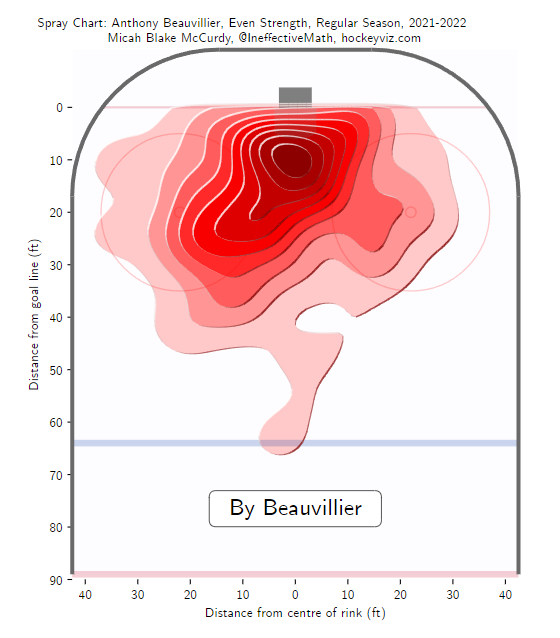
That is a lot of shooting from between the dots and below the tops of the circles, which isn't far off from what he did the year prior. That translates to an expected goals rate identical to COVID 2021 and higher than 2019-20, despite considerably fewer actual goals. I have to think this is a blip, and not a trend, and that the goals will rebound in 2022-23. Then again, the Islanders will have a new coach behind the bench, so that could throw a wrench in things.
Ironically, he did set a career-high in assists with 22, but he also managed as many PP assists (6) in 2021-22 as he did in the prior three seasons combined. He just hasn't turned into a great playmaker which will mute his assist totals moving forward. Without a prominent role and top PP minutes, relying on him being more than a 50-point winger is probably asking too much. Adding in the fact that his hit rates have fallen substantially over the last couple seasons means that this may not be a great fantasy asset in 2022-23.
The last guy we'll talk about is a pending restricted free agent in Brock Boeser. Beyond his RFA status, Boeser has his worst production season of his career, managing just 0.65 points per game, the worst for him in any full season. He had 23 goals in 71 games, a 27-goal pace per 82 games, worse than his 32-goal pace over the prior four seasons. The silver lining here is that he managed 19 goals and 36 points in 49 games following Bruce Boudreau's hiring in early December. That works out to 32 goals and 60 points per 82 games, much closer to career averages.
Boudreau really did wonders for this team after being hired, which is why some of this has to be taken with a grain of salt. Vancouver generated 30.3 scoring chances per 60 minutes at 5-on-5 with Boeser on the ice under Boudreau, against just 27.5 under Travis Green. Boeser suffered from genuine bad luck under Green, with the team shooting under 3% with him on the ice (completely unsustainable), but there's no denying the team was better in a lot of ways under Boudreau, and Boeser was no exception.
Unfortunately, what we saw from Boeser over the course of the season kind of mirrored his COVID 2021 campaign. In that year, he was well below average in scoring chance assists with 1.42 per 60 minutes (league average of 2.48). That improved under Boudreau in 2021-22, moving up to 1.65 scoring chance assists per 60 minutes, against a league average of 2.45. In other words, he improved his playmaking a bit, but there are reasons why he had just 23 assists in 71 games besides bad luck. Maybe he pushes 30 helpers with a better start to the year, but he did that in 69 games back in 2018-19. Reclaiming what he did three years ago as a 25-year-old isn't what we want to see.
That is kind of Boeser's problem. His playmaking hasn't taken off in the NHL, and it's why his best three seasons averaged 68 points/82 games. It isn't a bad mark, by any means, but it's not fantasy stardom. He is truly a shooter, and an excellent one, and he's fine (if not great) in transition. But his playmaking remains an issue, and that will mute his assist totals. Muted assist totals, combined with a lack of hits, means there are some key categories missing in multi-cat fantasy leagues. He is not as bad as guys we've mentioned in this regard, but he's not great, and that will keep him from taking the next step in the fantasy game.
He is still 24 years old and we've already discussed players hitting their stride in their mid-20s (or in Evan Rodrigues's case, late-20s) in this series of Ramblings. It isn't to say that he can't hit 45 assists in the next few years, it's just to say I wouldn't expect it in 2022-23. We need to see the underlying playmaking stats improve a lot more than 10% in a single season for that to happen.

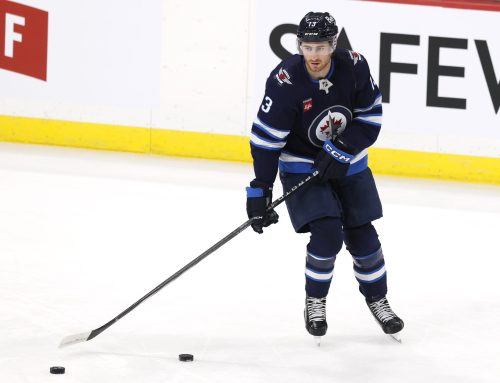
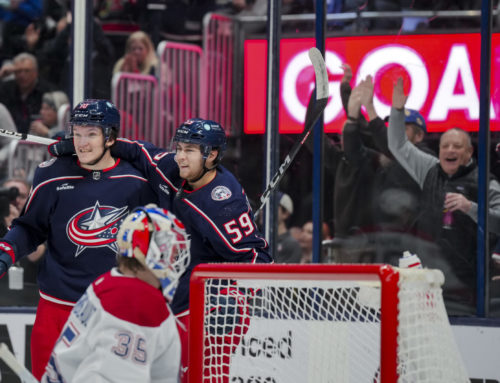
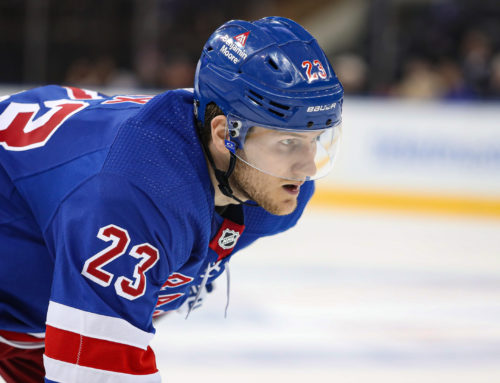
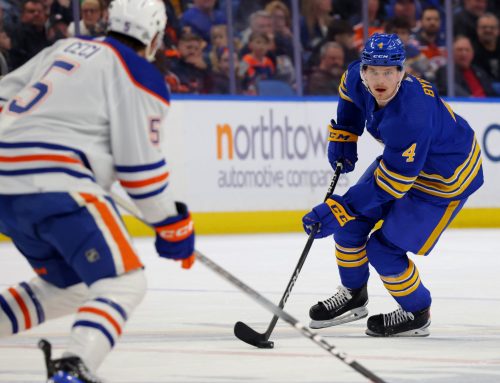
 FLA
FLA CHI
CHI NYR
NYR PIT
PIT L.A
L.A COL
COL CBJ
CBJ ANA
ANA TOR
TOR MTL
MTL SEA
SEA S.J
S.J VAN
VAN BOS
BOS WSH
WSH
